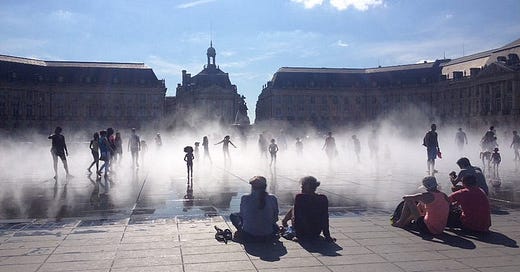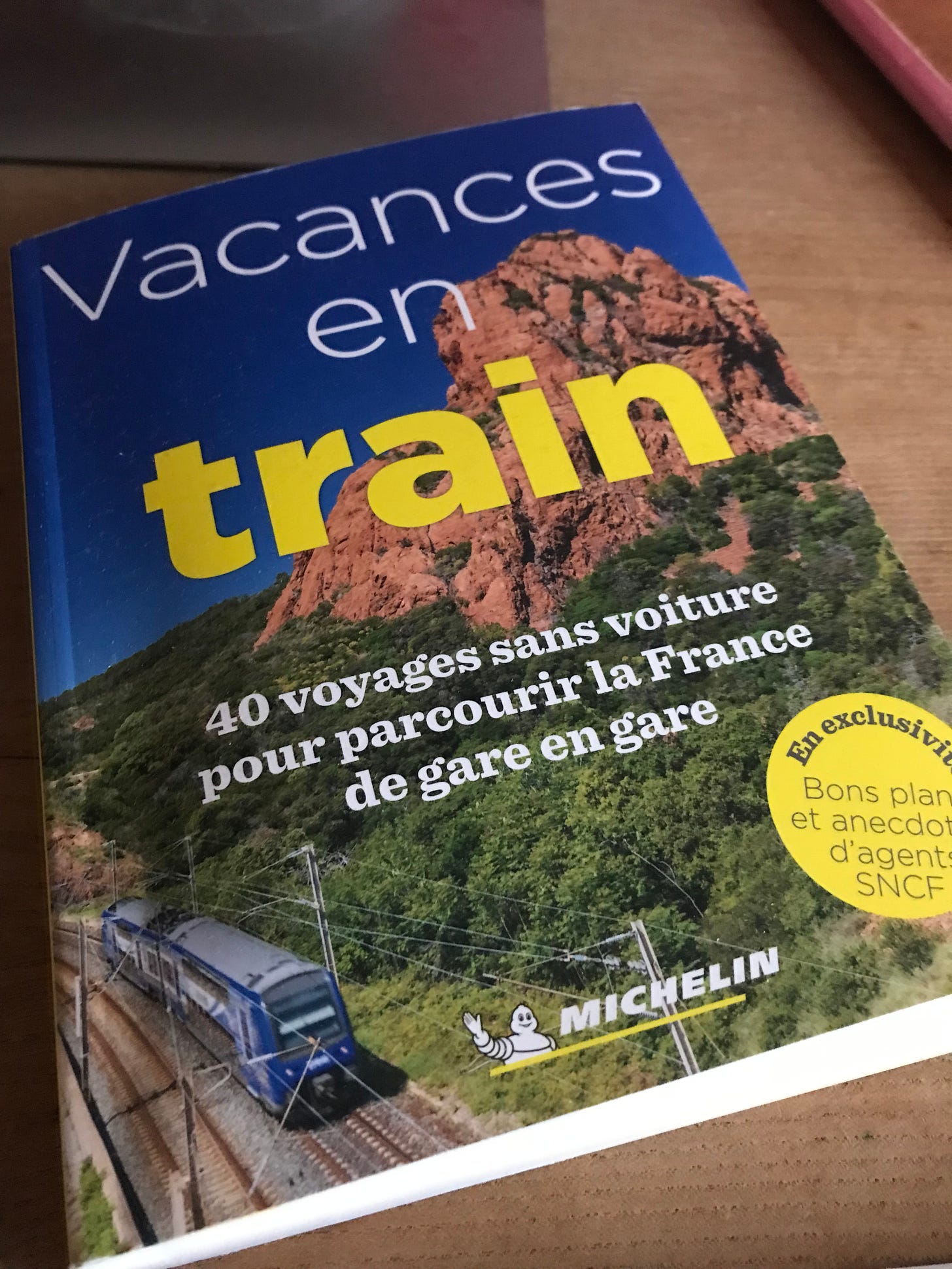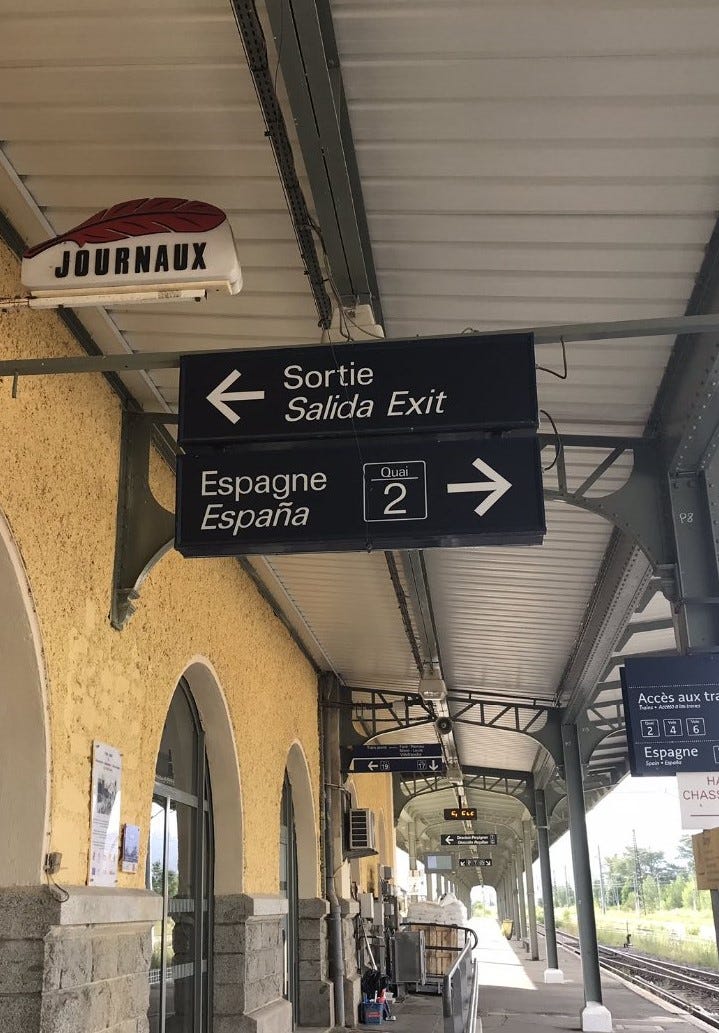Family holidays with more trains & fewer planes — seven things we’ve learnt along the way
Our holidays by train have mostly - but not always - gone to plan. Here are some practical tips.
Around 15 years ago, as a family we started looking at how we could travel more on holiday by train, rather than by plane — primarily to try to reduce our environmental impact, in the face of our climate crisis.
It’s been largely a really positive thing — with a few bumps along the way — and lots of little lessons learnt.
So a few days after coming back from our latest trip to France and Spain by train, I’ve pulled together a list of things we’ve learnt since our first trip to the south of France 15 years ago.
First of all, a few quick caveats. These are our personal reflections, based on a number of trips — mostly to France - over the last ten years. It’s not a comprehensive guide — The Man In Seat 61 is your man for that.
Instead it’s a list of things that other people who might be interested in traveling more by train in Europe — particularly with kids — might find useful.
1- Embrace the fact that it‘ll be a different kind of holiday
It’s unlikely that you’ll do a like-for-like switch from your regular holiday by plane to one by train. It will probably, of course, take longer to get where you want to be. And it might not even be possible to get to your favourite holiday destination on the train.
But it could well be possible (see below for sites that help you do your research). And if not, it’s a great opportunity to maybe head to somewhere new — and perhaps somewhere a bit less on the tourist trail.
Trains also give you much more of an opportunity to do a multi-city trip — even if it’s just for a few hours between connecting trains — with your suitcases safely stored at the station’s Left Luggage.
2 - Rail Europe, The Man in Seat 61, and Eurostar websites are key to successful planning
Let me be honest — booking a holiday on trains is nowhere near as simple as booking a flight.
This is where The Man in Seat 61 is your friend. It’s a brilliant website with all the info you’ll ever need on how to travel by train in Europe and beyond.
Once you’ve got an idea of where you want to go, co-ordinating a few legs of a journey can be a bit of a challenge.
Different train companies have different booking windows for a start. More often than not, you’ll find Eurostar is the first train you can book, sometimes up to 6-8 months before your travel date.
Other train companies vary, but tickets will typically go on sale around three months before your journey. This is where setting up a Rail Europe booking alert is useful — to give you the best chance of getting a cheaper ticket - although I’ve noticed recently that this feature isn’t always available. There’s more on how to book tickets here on Seat 61. I’ve found the SNCF Connect app pretty reliable for sending me French train booking alerts.
Co-ordinating (and remembering) all of this can be a bit of a challenge — particularly if you’re unsure if (or at what times) a train will be running on the day you want to travel.
I mostly book on Rail Europe as it’s easy to use and the app is good if you choose e-tickets - and if you end up needing to get a refund on any tickets. There’s a booking fee (currently £2.99 no matter how many tickets you book) so if you can book more than one leg at the same time, you can save a bit on fees.
The Man in Seat 61 often has info on future timetables — so it’s worth doing your research. Yet this is undoubtedly one of the more challenging aspects of choosing to travel by train instead of the plane. But it gets easier the more you do it.
3 - Make the journey part of the holiday
It’s a cliché, but it’s true. Train travel can be enjoyable in itself — and it gives you opportunities to visit more than one place — even if just for a few hours.
You’ll have an idea of how quickly you want to get to your final destination — and it’s tempting to try to get there as quickly as you can, perhaps with a few tight connections.
That’s doable — but clearly a bit more risky, and potentially more stressful, particularly with kids. For that reason we’ve tended to break longer journeys up.
Lille has been a favourite stop over place for us for holidays to France — and whilst there aren’t as many connections as in Paris, there are a good few options for heading south (and perhaps bypassing Paris altogether).
There are only two train stations in Lille — within a ten minute walk of eachother — so connections between Eurostar and your next train are straightforward.
This hotel opposite Lille Europe is really convenient — particularly if you’ve got an early train the next day.
And even if you don’t stay over somewhere along the way, maybe think about a few hours sightseeing where you’re changing trains. There may well be Left Luggage facilities — or you may choose to use a service like Nannybag, or perhaps at a nearby shopping centre (like here at Westfield Lille Europe).
The beauty of traveling by train is that you usually arrive right in the centre of a city — not 20 miles away at an airport.
With a bit of planning you can have a lovely few hours in somewhere new, break up your journey, and stress a bit less about tight connections.
4- Sleepers are great — but think about what you’ll do when you arrive
I’m well into middle age and I still get excited about the idea of falling asleep on a train and waking up at the other end of the country.
We’ve only travelled by sleeper train in France so don’t have wider experience than that, but we’ve found it to be really good way to head south in a pretty time-efficient way.
There’s loads of info on Intercités de Nuit trains in France on Seat 61.
What’s worked for us (a family of three) is booking a first class four berth couchette to ourselves. If there’s fewer than four of you, in theory you can pay an Espace Privatif supplement so that you have the compartment to yourselves — although I’ve never managed to find that on the website. The alternative is to pay for a phantom fourth passenger, as outlined in the link above.
Or of course you could embrace the idea of sharing with someone you don’t know…. but there’s not a load of room in the compartments (and less in the six berth 2nd class compartments).
We’ve found the couchettes comfortable, and the journeys pretty smooth. It’s unlikely you’ll get the best night’s sleep ever, but we’ve always slept pretty well. There may or may not be breakfast available, and there may or may not be sockets for charging phones, so be prepared.
The great thing about a sleeper train is obviously that you save on the cost of a hotel and arrive first thing at your destination (or next leg).
But arriving somewhere early morning isn’t always that convenient, depending on what you’re doing for accommodation.
If you can’t check into your Airbnb until 4, or your campsite until 2, you might well be hanging around a while.
Best bet here is to plan ahead — ask about early check-in, or about dropping off luggage so you can begin exploring, or find out about Left Luggage at or near the station.
And one final tip if your outbound journey involves getting across a city (eg Paris) by metro. If you’ll be doing the same journey in reverse a week or two later — buy your Metro tickets in advance for your return journey (or, even better, see if you can buy e-tickets via your phone - or from an app like this one for Paris).
Trust me, you don’t want to be in a long queue of hungry people who’ve just got off the sleeper and are trying to work out how to get the ticket machine to work - to get from Gare d’Austerlitz to Gare du Nord.
5- Travel in style if you can afford to pay a bit more
You’ll no doubt be on a budget — and it’s likely that you’ll spend more than you would do on a flight — even if you buy your tickets on the day they come out.
Our most recent journey, via London, Lille, Paris, Latour de Carol, Sitges, Barcelona, Bilbao, Hendaye and back home, cost us around £425 each. Which I don’t think is bad for all that travel, but is undoubtedly more than a point-to-point flight to somewhere in Spain.
But it’s certainly worth looking at options for upgrading to First Class on at least some legs of your journey.
In our experience first class on TGV’s in France is often not much more expensive than standard class, if you book in advance. And whilst you don’t get any food or drink, the seats are comfier and there’s more room for your luggage.
Also, when our son was a baby and we didn’t have to pay for a seat for him, the wider seats in first class on the TGV gave us all a bit more room.
And if you’re traveling through France on a TGV, don’t forget to check if the train is a Duplex (double-decker train). If you can make it up the stairs, the view is better — and who doesn’t find the idea of going upstairs on a train exciting?!
All the info on French double decker trains and how to book an upstairs seat is here.
Finally, if it’s not too expensive, we tend to upgrade to First Class on the last leg home from London.
It feels like a little bit of luxury after what’s likely to have been a long journey.
And practically, it can be good to give yourself a generous connection time between Eurostar and your onward journey, in case of any delays. Then if you’ve got a First Class ticket for the final leg home, there may well be a lounge where you relax if you do end up with a couple of hours to spare before your final journey.
6- Come prepared for your longer journey
There’s every chance your train journey is going to be longer than a flight.
Having said that, the difference may not be as much as you think, when you take into account that trains usually drop you right in the heart of the place you’re visiting, not at the airport 20 miles away.
And if our recent experience of Eurostar is anything to go by, queues to get through passport control and security might well be a lot shorter than at your local airport.
But of course, it’s likely to be a longer journey. So be prepared.
You’ll know what works for you. Games to play with the kids. Food and drink (particularly if you’re unsure whether there’ll be catering available, eg on a sleeper train, or if anywhere will be open at the station before you set off on your late night sleeper train).
And, of course, chargers. There’s a good chance there’ll be plug sockets, but don’t rely on it. We’ve found a power bank for charging up mobiles a worthwhile investment — particularly if your tickets or passes are on your phone.
And with that in mind, maybe consider print-at-home tickets rather than mobile ones.
As outlined earlier, train travel can be a genuinely enjoyable and relaxing experience, particularly if you can break up your journey, or upgrade to first class for some of the legs. But it really does help if you’re prepared, particularly if you’re traveling with children.
7 -Not sure you can manage train both ways? How about one way?
Different people will have different reasons for wanting to travel by train. Increasing numbers of people are choosing not to fly at all, and I very much see where they’re coming from.
We’ve made a commitment to do our best to find alternatives to flying — but we accept we’ll still occasionally fly if it’s not a practical option. We’ve probably got the train for somewhere between a half and two thirds of our holidays over the past 15 years. So not all of them — but certainly a lot more than in the previous 20 years.
If you’re not quite sure just yet about taking the train instead of the plane, how about considering train one way?
We did that in 2016 for a holiday to France. We flew to Paris, and stayed in one of the many hotels in Roissy, near Charles de Gaulle airport (this is also a good tip too if you want to stay in Paris but can’t find an affordable hotel) and then got the train into Paris to see the finish of the Tour de France.
We then jumped on the high speed link from Charles de Gaulle airport and headed down to Bordeaux — before then traveling back on a direct train from Bordeaux to Lille and then home on Eurostar.
A story which, once again, demonstrates how traveling by train can give you flexibility that you might not get if you fly.
If you’re going to go by train one way, should you do the outward journey or the return? It’ll depend — but on balance I’d suggest taking the train for the outward journey — it’ll feel more exciting, particularly for kids, at the start of your holiday. If you find it’s not for you, then at least you’ve got a quicker journey home.
Hopefully that gives you a bit of a taste for traveling by train for a holiday abroad.
We’ve had a lot of fun over the years — and we’ve discovered a lot of places we’d never been too before — often because in planning our trips, they were places that were good stop-off points for longer journeys.
And of course, this matters on a much bigger scale, demonstrated today as I sit writing this in my spare room, curtains closed to keep out the intense heat of what will likely be the hottest day on record in the UK.
We are in a Climate Emergency — and how we get around is one of the most significant contributors of climate emissions.
So it’s clear that those of us who are wealthy enough to fly to places on our holidays need to fly less. And the alternatives need to be be better known, simpler, and cheaper.
Train travel isn’t without its challenges — but with a bit of planning in my opinion it can be a much more enjoyable experience than flying — as well as being a much more environmentally friendly way to get around.
If you’ve got any questions or thoughts, please leave a comment below.









Hi Rob - I am re-reading this whilst sat on a train to Berlin! I remember reading this a year ago when we were first considering the idea of a family interrailing trip and I was looking for ideas and inspiration! Here we are now - 10 days into our trip, with another four days to go! We have travelled through the Netherlands, Germany and Austria so far. We have kept our plans quite simple, choosing to spend more time in a few places, over dashing around Northern Europe! We chose an interrailing ticket which offered four days of travel and bought it in their New Year sale. We have all really loved the trip so far. Sleeping on a barge in Amsterdam and an overnight sleeper to Innsbruck have been my teenage daughters accommodation highlights. Hiking in the Stubai valley has been wonderful over the last week with so much to do courtesy of the Stubai Super Card, offering lots of public transport options to travel around and explore. We are now looking forward to embracing all that Berlin has to offer for a few days before we head home via Brussels middle of next week. Thank you for the initial inspiration and top tips!